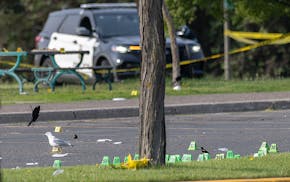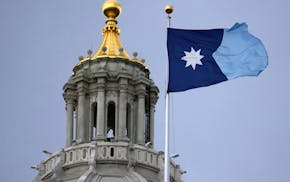Gov. Tim Walz and Lt. Gov. Peggy Flanagan haven't been seen together publicly in seven weeks and the two aren't communicating or meeting privately, a rift that coincided with his return from the national campaign, according to multiple sources close to the governor's office.
The first public indication that something was amiss came just three days after the election. That afternoon, Walz gave his homecoming speech to staff, commissioners and invited DFL guests at Eagan High School. Flanagan wasn't there and sources with knowledge of the situation said she wasn't invited.
Instead, First Lady Gwen Walz introduced the governor with a short speech, a task that routinely fell to Flanagan for official government events. Then in his remarks, Walz thanked his wife, family and staff. He did not mention Flanagan by name or title, even though she had spent weeks enthusiastically campaigning for the national ticket led by Vice President Kamala Harris and helped run the state while he was gone.
Walz was asked in a recent interview if there was tension when he returned given Flanagan would have succeeded him as governor if the Harris ticket had won.
"No," Walz responded. "There would be time to figure out all that afterwards. I was solely focused on making sure the state of Minnesota was going, we were getting things done. The lieutenant governor was here doing the work that she needed to do, reaching out to community."
Others who spoke on condition of anonymity said the Walz team was not pleased at steps Flanagan had taken to assume the governorship, conferring with potential key hires and preparing for a possible run herself in 2026. "If the people of Minnesota want me to continue to serve, I am absolutely open to that," Flanagan said at the State Fair in August.
The Walz camp was especially irked because Flanagan had tapped Walz's gubernatorial campaign fund without authorization for some work, multiple sources said.
Had the Harris-Walz ticket won, Flanagan would have faced a cyclone of work, having to assemble a staff and prepare for the 2025 legislative session as Walz moved to D.C. with his top staff. Flanagan has not responded to a request for comment.
In the past seven weeks, there have been other public and private events at which Flanagan's absence was remarkable.
She was not at the pre-Thanksgiving turkey event at the Capitol nor was she at the 90-minute media reception with cookies and punch at the governor's current Eastcliff residence. Flanagan and her family have attended both events in previous years.
Multiple members of the governor's staff declined to talk about the tension, but the public estrangement has been the talk of the Capitol.
Minnesota governors and their lieutenants run as a ticket but that doesn't mean they're politically aligned or personal pals. Throughout their six years, Walz and Flanagan claimed to be trusted partners, friends from the day he walked into a Wellstone Action class and she was his trainer. At official events, she was by his side.
When Walz joined the national ticket, Flanagan vouched for him in interviews as a good governing partner. On the Monday before the national election at a sendoff for Walz at the charter terminal at Minneapolis-St. Paul International Airport, Flanagan posted on social media a photo of herself and Walz on the tarmac in front of his campaign plane. "One more selfie for the road," she wrote. "Go get 'em, buddy."
After Walz's national loss, something shifted. On the Friday morning of his return three days after the election, Walz convened a small meeting with his chief of staff, Chris Schmitter, his general counsel, Flanagan and Dominic McQuerry, who was then the senior adviser to the lieutenant governor, according to multiple sources who knew of the meeting.
None of the participants spoke about the meeting, but within a month McQuerry had left the office after nearly two years. His social media post gave no explanation for his departure or an indication he had lined up new work.
When Walz was asked in a recent interview whether he had fallen out with Flanagan, he deflected.
"We're back and I'm re-establishing what I need to do as governor," he said. "To re-establish the things where, we were still able to govern … just clarifying what we're going to do as we think about what the future looks like."
Asked specifically why Flanagan was left out of the Eagan homecoming and the cookie party, Walz spokesman Teddy Tschann interjected that Flanagan was busy with other engagements.
The governor then denied knowledge and didn't express curiosity or interest in whether Flanagan had been invited. "I don't know, and I don't do the planning on that," Walz said.
Steven Schier, Carleton College political science professor emeritus, said it's not uncommon in Minnesota for the governor and lieutenant governor to maintain a distance from each other. "What is notable are the timing of this and the apparent reasons for it," Schier said. "Peggy Flanagan and Walz were joined at the hip for six years and now they seem separated by their individual ambitions."
He noted that Walz and Flanagan came from different parts of the state and different factions of the DFL Party. Walz is from Mankato; Flanagan lives in St. Louis Park.
As a congressman from Minnesota's First District, Walz positioned himself as a moderate while Flanagan came from the party's progressive, activist wing. Schier said Walz may be seeing the risks of Flanagan's progressivism "given Trump's win and GOP gains in Minnesota."
To some in DFL circles, the bonus of a Harris-Walz victory would have been the ascension of Flanagan as Minnesota's first female governor joined by Senate President Bobby Joe Champion, DFL-Minneapolis, as the first Black lieutenant governor. Flanagan also would have been the nation's first female Native American governor.
Asked how the excitement over new executive leadership might shape his thinking about whether to seek a third consecutive term, Walz was terse, saying, "We could always have a primary."
Wildfire smoke extends Minnesota air-quality alert through Wednesday morning
Minneapolis Council Vice President Chughtai fails to win DFL endorsement; assault allegations fly

A 23-year-old woman was killed in 'war zone' shooting at Minneapolis' Boom Island park

